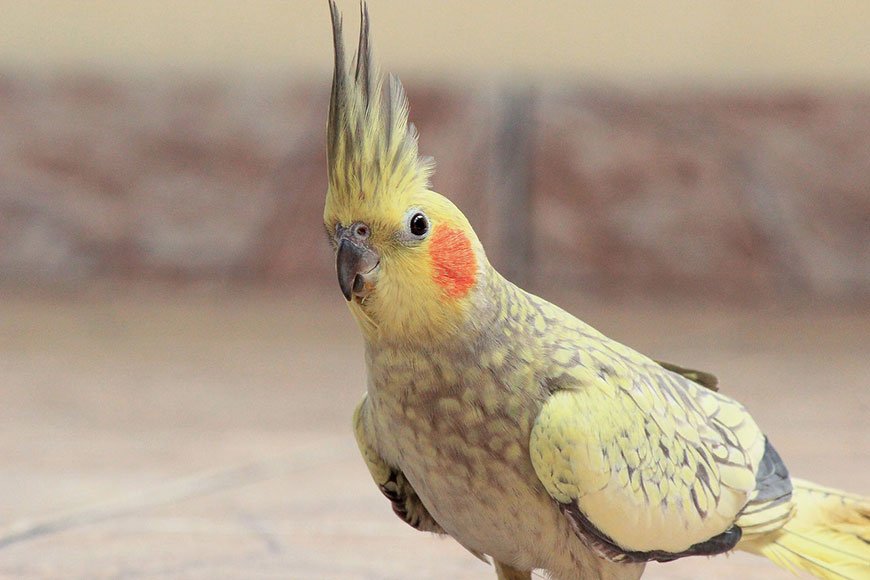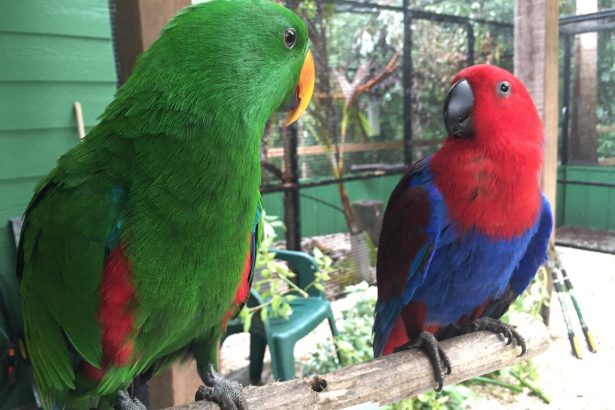We produced this article because we often get the question: how do you train a bird? Birds can be an absolute handful if they aren’t given the right training. Not only will they act out and often destroy things, they will be generally unhappy. In order to best train your bird, you have to understand how birds think, how they operate, so you can give the correct signals over time that will positively respond to. In this article we will cover several aspects of bird training to help you understand what works, what doesn’t and what is counterproductive.
The Right Approach to Parrot Training
Before we get into this section, it’s important to first mention that taking on a parrot, or any other bird as a companion, is a commitment to the life and well being of the bird. Some species of birds, such as cockatoos, often outlive their owners and sadly some of those owners don’t make the necessary arrangements for their companion before they are gone – leaving the bird in limbo.
Now with that said, parrot training can be a rewarding experience for you and your bird if it is done correctly. Keep in mind that your parrot is going to grow from its wonderfully cute stage into an adolescent and just like an adolescent human, they need guidance. Bird behaviour problems are a problem with the owner, not the bird. It’s up to you to teach your bird manners and properly socialise them as well as make sure their nutritional needs are being met – and also consider their psychological needs. An adult parrot is definitely intelligent, having a mental capacity similar to that of a child as old as 5 years. Kids at that age will be trouble without proper parenting.
Birds are flock animals and when they are in captivity, they don’t have the flock to teach them how to behave. So it is entirely up to you to give your bird the tools it needs to thrive with your family. Parrots have a natural instinct to get to the top of the pecking order as soon as possible, but you do not want your parrot to rule the roost. It’s not healthy for both the parrot and your well being.
One common mistake that bird owners make with bird training is making it too rigorous for too long. You want to approach parrot training in short, effective intervals and then give your parrot time to relax. In order to get your companion to respond to your training, you have to consider their psychological needs and be the one there to fulfil them. This is the best way to form a lasting bond with your parrot. Remember there is no room for negative reinforcement or cruelty when you are working to achieve better parrot behaviour. The way to approach bird training is always with positive reinforcement when the bird is showing improvements and simply ignoring behaviours that are undesirable or unacceptable. Patience is paramount for every bird trainer.
Budgie Training, Cockatiel Training and Proper Routines
Budgie training, cockatiel training or any other type of bird training will heavily rely on routine. Just like humans, birds like a bit of structure and setting up the right, consistent times for training sessions is key to bird training success. When you begin training, try to find areas in your schedule that are both consistent every day and where you will not be stressed out due to work or general life drama. Your stress will carry into your training session because birds are excellent at reading body language. Also, when training your companion, if they start to lose interest, give them a break.
Learning to give dominant signals both during bird training and in general is imperative. You must be confident or the bird will not see you as the leader you need to be. Remember, dogs like to explore the world with their snout, birds are much the same and like to explore their world with their beak. But they need to be trained to be gentle when exploring humans and other living creatures. Being confident when handling your bird is another part of bird behavioural training – you want to get your bird used to having their beak stroked.
In conclusion, understanding bird behaviour while training is the best way to avoid bird problems down the line. Do you still have questions about how to train a parrot? You can find more in depth information by clicking here. We also provide “one on one” training to those who own Gold Coast birds and behaviour sessions with owners and their birds. Contact us on 5533 0381 during office hours and we will organise a behavioural consultation with you.
FAQs
Typically you want to be training your bird with every interaction. But a safe bet is to set aside at least an hour per day for bird training sessions. Pay attention to how your bird is reacting – you don’t want them to get frustrated and bored with your bird training sessions. Make sure if they appear tired to not push the limits so you can get the best out of your time together.
There can be a number of reasons why your avian friend may not be responding to your bird training. Often, it is a matter of confidence. Birds are wildly intelligent and can pick up on the slightest insecurity. If you don’t have faith in yourself as the trainer, they will know and take advantage, much like a human child when they throw tantrums. If you are experiencing bird behaviour problems that you cannot seem to correct, it is probably time to bring them to an avian vet for professional training sessions.
Parrots are very smart birds, which means that they can receive bird training very well if you are deliberate in your approach. Understanding bird behaviour is imperative when it comes to training them. They need frequent and consistent parrot training sessions so they can count on you as their leader and in turn believe in you as their life companion.






1 Comment
Comments are closed.